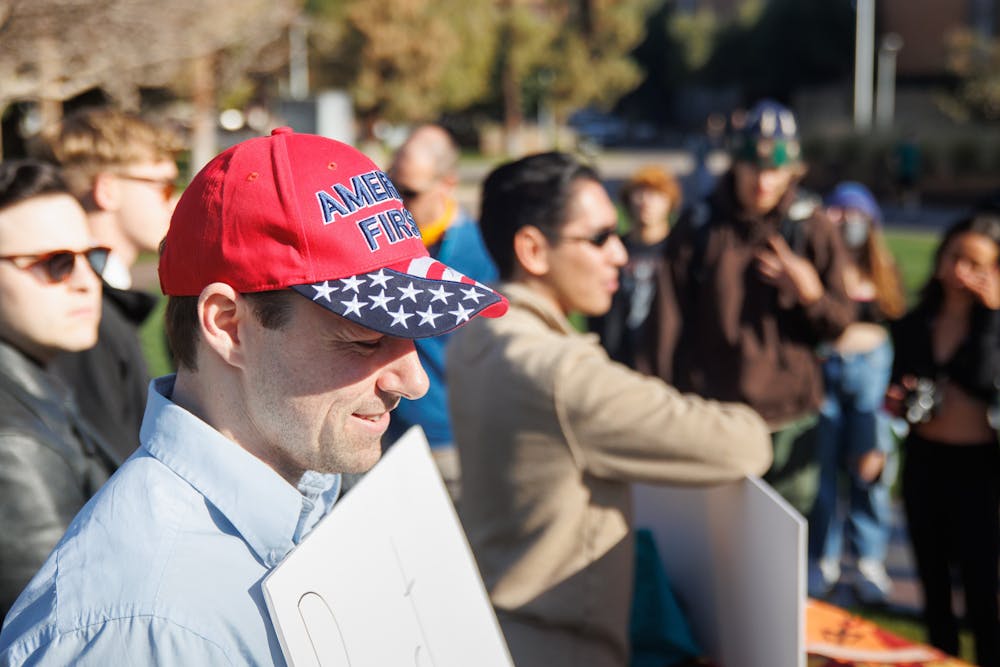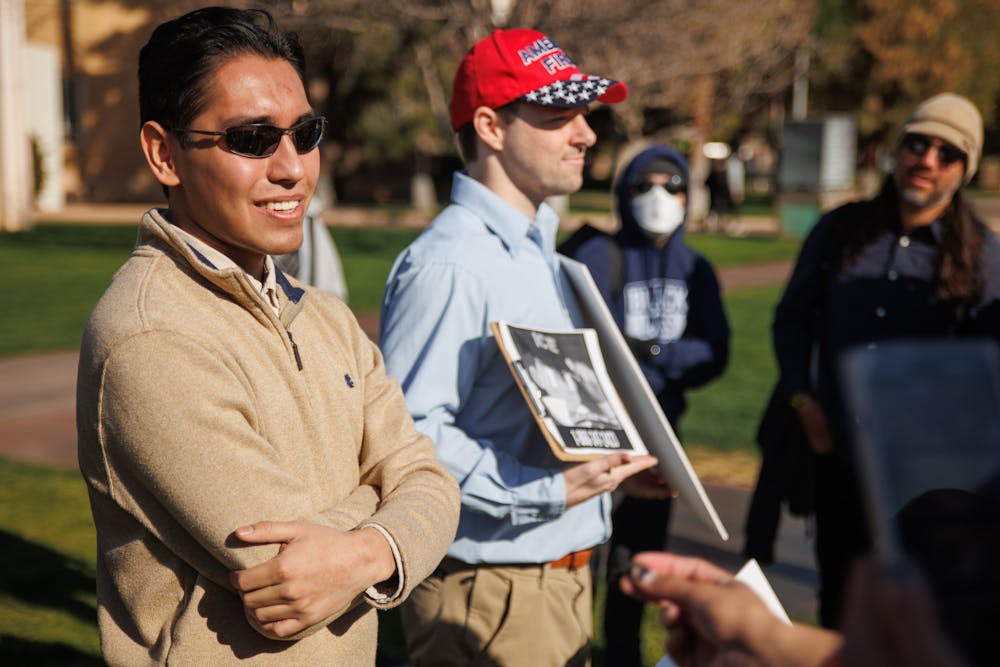A small group of members from College Republicans United at ASU gathered on Hayden Lawn earlier this year, urging University students to call U.S. Immigration and Customs Enforcement on fellow students.
The event sparked outcry from many student organizations on campus, and among these statements of condemnation of CRU at ASU's event was College Republicans at ASU.
"We felt it was our obligation, so that the media was not delegitimizing our club members now and the former club members... to take the backlash of some other illegitimate and irresponsible organization on campus," said Carson Carpenter, a senior studying political science and the former president of College Republicans at ASU.
READ MORE: Hundreds protest CRU at ASU event, in solidarity with immigrants and DACA students
Actions like these point to a larger phenomenon of the divide between these two student groups, who hold different presences on campus despite being distinguished by just one different word in their titles.
Members of the current College Republicans made a clear effort to separate themselves from the CRU at ASU event as well.
"I remember people telling me about it (the tabling), and I was like, 'That's not us,'" said Mason Kasimov, a sophomore studying political science and a member of College Republicans.
Carpenter described the differences between the two groups as being "ideological, but it's also organizational."
The organizational divide between these two was present right from their inception, as CRU was formed as an offshoot of College Republicans due to conflicts in leadership and management.
"What happened was basically a full year of playing parliamentarian, fighting the rules, just trying to use the rules within the bylaws to navigate the corruption that was going on," said Rick Thomas, founder of CRU at ASU.
Thomas later said the situation propelled the formation of CRU, as a group looking to rectify issues they saw in College Republicans.
"Our committee — which was leaderless, it was a hodgepodge of f---ing people that were pissed off with the College Republicans — nominated and elected me as the first president of College Republicans United," Thomas said.
This rift was furthered by the two groups operating under distinct national chapters, which coordinate aspects of the club, like event funding.
CRU can be found in around six regions, while the College Republicans have a presence in 29 states across the country.
Thomas said an element of intrigue surrounding the College Republicans and CRU is the fact that College Republican chapters function differently depending on its campus. Thomas said a College Republicans chapter in Pittsburgh pledged to assist ICE in a "similar" fashion.
The College Republicans at Pittsburg State University responded to an email listing resources for students in the situation that ICE appears on campus.
"This is the same chapter that ASU (College Republicans) belongs to that denounced us, so their messaging is not consistent."
During Thomas' experience with College Republicans, each chapter was centered around hearing from local political candidates and organizing support for their campaigns.
However, Thomas said CRU aimed to foster a greater diversity of public figure representation than College Republicans was offering at the time.
"We didn't care if they're a libertarian, if they were far-right, if they were moderate," Thomas said. "Hell, bring in a Democrat. Let's have a debate. Let's have fun with this."
Despite the diversity in speakers, Thomas emphasized student involvement and exclusiveness, ensuring that each member participated adequately within their chapter.
"The bylaws were established differently and we really paid a lot of attention to procedure to make sure that it could not be infiltrated by outsiders," Thomas said.
However, College Republican at ASU's main critique is its lack of diversity within the group. Kasimov said that College Republicans at ASU let people with different views participate in the club, a factor he said he doesn't feel is present at CRU at ASU.
Carpenter furthered these critiques of CRU. He said its impact on campus as a whole, given their controversial events, can be antagonistic.
"You have to really start asking the question: 'do they bring any positive change to ASU?'" Carpenter said. "Do they really represent the ASU charter in any way? I haven't seen how they do that."
Thomas explained that pushback and counter-protests to CRU at ASU movements were fairly expected, including at the tabling on Jan. 31.
"I've seen more protesters do things against us in the past than this time," Thomas said. "I was expecting a response."
However, Thomas did take issue with the response that College Republicans at ASU gave regarding their condemnation of its tabling.
"I've tried to explain to them," Thomas said. "You guys (College Republicans) should really be consistent with conservative values — keep your mouth shut and just say it's not us and leave it at that, but they go the extra step and condemn us."
However, for Carpenter, Kasimov and the College Republicans at ASU, the backlash created by CRU at ASU creates ripple effects beyond the confines of the club itself.
"Republicans right now are seen as trying to stir the pot with everything," Kasimov said. "Trying to make everyone mad turns people off from your views."
Clubs like CRU at ASU and College Republicans at ASU hold a higher responsibility for members like Kasimov, not just as a student organization but as a surrogate for the ideology as a whole, which is why their actions hold so much weight.
"I don't want them getting the wrong ideas about Republicans because I can see that in some of my classes," Kasimov said. "People have the wrong ideas of Republicans."
Edited by George Headley, Abigail Beck and Natalia Jarrett.
Reach the reporter at sluba@asu.edu and follow @samluba6 on X.
Like The State Press on Facebook and follow @statepress on X.
Sam is a freshman studying political science with a minor in justice studies. This is his second semester with The State Press. He has also worked as editor-in-chief of his high school newspaper.





